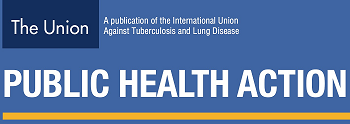
Integration of tobacco cessation and tuberculosis management by NGOs in urban India: a mixed-methods study
Design: A mixed-methods study (triangulation design) involving analysis of programme data and semi-structured interviews (quantitative) and thematic analysis of focus group discussions of TB treatment providers (qualitative) regarding brief advice and cessation support provided to self-reported tobacco users from August 2015 to July 2017.
Results: All 27 centres initiated tobacco cessation. Of 2132 registered TB patients, 377 (18%) were tobacco users, 333 (88%) of whom used smokeless tobacco. There was a progressive drop in documentation of tobacco status at each visit, reaching respectively 36% and 30% at the end of treatment for new and retreatment TB patients. Seven-day point prevalence abstinence at 6 months was 32% among new and 15% among retreatment cases. Enablers for integration included NGO collaboration, supervision and capacity building. Challenges included providers spending 15–45 min per patient (10 min recommended), multiple addictions, documentation load, self-reporting and social normalisation of tobacco.
Conclusions: Integration of tobacco cessation into routine TB care in an urban NGO setting was feasible, although without continued support, rigour in documentation declined. This should be scaled up with special attention paid to tackling smokeless tobacco and related operational challenges.
Keywords: SORT IT; integration; mixed-methods study; operational research
Document Type: Research Article
Affiliations: 1: Narotam Sekhsaria Foundation, Mumbai, India 2: Médecins Sans Frontières, Brussels Operational Centre, Luxembourg City, Luxembourg 3: International Union Against Tuberculosis and Lung Disease, South-East Asia Office, New Delhi, India 4: National Health Mission, Department of Health, Chandigarh, India 5: Department of Community Medicine, Sri Manakula Vinayagar Medical College and Hospital, Puducherry, India 6: Inter Aide Development India, Mumbai, India 7: Tobacco Research and Treatment Center, Massachusetts General Hospital and Harvard Medical School, Boston, Massachusetts, USA
Publication date: 21 June 2018
Public Health Action (PHA), The Union's quarterly Open Access journal, welcomes the submission of articles on operational research. It publishes high-quality scientific research on health services, providing new knowledge on how to improve access, equity, quality and efficiency of health systems and services.
The Editors will consider any manuscript reporting original research on quality improvements, cost-benefit analysis, legislation, training and capacity building, with a focus on all relevant areas of public health (e.g. infection control, nutrition, TB, HIV, vaccines, smoking, COVID-19, microbial resistance, outbreaks etc).
- Editorial Board
- Information for Authors
- International Journal of Tuberculosis and Lung Disease
- Public Health Action
- Ingenta Connect is not responsible for the content or availability of external websites
- Access Key
- Free content
- Partial Free content
- New content
- Open access content
- Partial Open access content
- Subscribed content
- Partial Subscribed content
- Free trial content